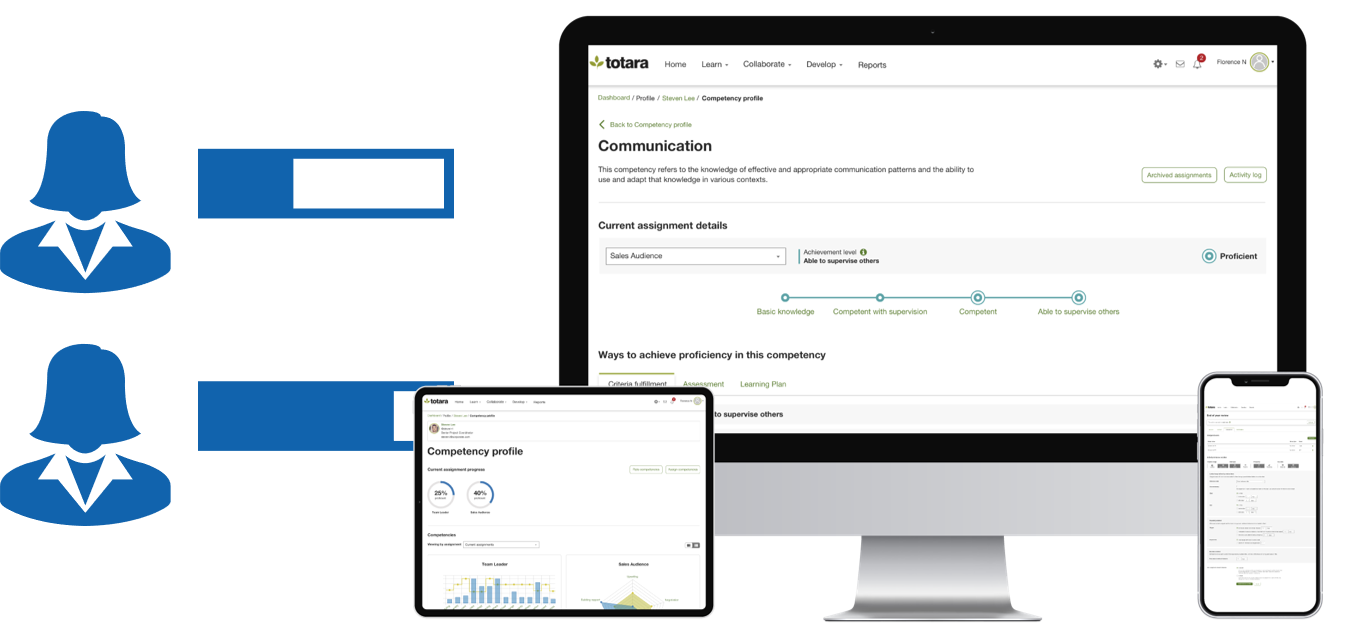Annual performance review. Is there another three-word phrase in the English language that can so successfully fill people with an overbearing sense of dread?
Maybe ‘replacement bus service’ is up there as a contender.
The annual performance review is what a lot of people’s minds jump to when we think about performance management, but that’s just a small part of the process.
Performance management encompasses a whole range of strategies, from setting goals to assessing progress and keeping employees’ skills up to date, all with the end goal of improving performance.
So, it’s important that performance management is done right. The traditional processes, of which the annual review is a stalwart, are beginning to feel outdated and ineffective.
Many organisations have already made the switch to informal performance management processes but it’s all about achieving the right balance for your organisation.
Let’s look at how that can be achieved using Totara Perform:
What are the goals of performance management?
When we think about performance management we probably envision meetings with employees in which we either say: “You’re doing really well, keep it up” or “You could improve your work in these areas.”

On a very basic level that’s correct. Performance management is about making sure your employees are performing at the level required. There are more specific goals that performance management should be trying to meet however:
1. Identifying and resolving issues
Performance management isn’t just a way to pat a hard-working employee on the back or motivate an underperforming employee to succeed.
These settings are also great for communicating with employees about any issues or difficulties they are facing. Perhaps there are hurdles holding them back from success that you were unaware of. This aspect is particularly important for remote workers as they may be less likely or slower to reach out for help.
Identifying and resolving issues early on prevents them from snowballing into much larger problems down the line and also keeps your staff feeling happier and more engaged.
2. Improved skill development
For those in charge of performance management processes, ensuring the success of your employees is your top priority.
Discussions with employees in performance management settings should also involve asking whether they feel they have the necessary skills and knowledge to effectively carry out their roles.
Whether these conversations lead to a need for more training or just a bit of guidance from more senior members of staff, identifying opportunities for the development of your staff’s skills can be hugely beneficial for organisations.
3. Improved career options
If you’ve identified your top performing staff you can use performance management processes to talk to them about career progressions.

Ensuring that employees, especially high performers, feel as though they are trending upwards in your organisation and have a potential path of progression in front of them can be useful for keeping them engaged and excited about working for your company.
Asking if they have an interest in any particular aspects of their role that they might like to expand or specialise in down the line will ensure that they feel listened to and give you an indication of where future managers and leaders might come from.
4. Boost employee retention
Minimising staff turnover is important for organisations as it not only reduces cost and saves time on onboarding new staff, but also instils a sense of loyalty in employees, which should be rewarded.
All of the above goals contribute to employee retention because, done right, performance management gives staff an opportunity to iron out any issues they are having and improve their prospects within the organisation, keeping them engaged and happy.
Some common performance management issues
Outlining the goals of performance management makes it all sound very easy but as with most things the reality can be a little more challenging if the right processes and strategies aren’t in place.

Here are some of the common performance management issues and how to avoid them:
-
Lack of clear goals – without goals to measure employees against it can be difficult to establish what constitutes good performance. Goals should be measurable and clear so both you and your staff know what they are working towards.
-
Lack of regular communication – the traditional annual performance review system risks letting issues linger for longer than they need to. Keeping in regular contact with employees ensures they are happy and heading in the right direction.
-
Lack of skills or time – if your employees aren’t meeting their goals it’s important to find out why. Often it can be a lack of necessary skills or simply not enough time in the working day that is holding them back from success and resolving these issues will set them back on the right path.
-
Lack of feedback from employees – performance management shouldn’t be a one-way street. Employees of course need feedback to act upon but you should also welcome feedback from them about the processes and systems that are in place around them.
|
Hubken’s Totara Perform Solution |
What is ‘traditional’ performance management?
The traditional style of performance management focuses on performance reviews, often annually, as a way of letting employees know how they are performing, and performance improvement meetings for employees who are struggling to meet objectives.
While these processes do have some merit when it comes to formal performance management, they do also have some key flaws. The infrequent nature of the meetings is the most glaring weakness of this traditional style, as well as the lack of room for regularly encouraging employee growth.
Performance reviews and appraisals
Performance reviews are often viewed as a source of dread. For managers, delivering negative feedback can feel awkward and there are legitimate concerns over damaging relationships with employees, even when feedback is delivered constructively. For employees, the fear of a negative review can cause anxiety and even stop them from working effectively.

Because they often only occur once a year, feedback has to stretch over the entire period and often achievements or failures can be missed or glossed over in favour of the bigger picture. With little or no recognition of achievements throughout the year, employees can quickly start to feel undervalued.
Performance improvement
When it comes to employees not meeting objectives, performance improvement processes are designed to provide help and support. Unfortunately, done badly, they can discourage employees further and even begin to feel like disciplinary actions.
Here are some key points to keep in mind when it comes to performance improvement:
-
Employees should be given a chance to explain – there may be barriers to success that mangers were unaware of, whether that’s a lack of skills or time, or even factors outside of the work environment. These can then be worked through and the employee supported.
-
Expectations and timelines for improvement – as important as it is to support your employees, it’s also important that they do actually improve. Setting out expectations and timelines for their improvement will allow them to work towards clear and achievable targets.
Why introduce informal performance management?
Many organisations are beginning to challenge the traditional, formal ideas and make the switch to more informal, fluid performance management processes that benefit not only the employees but also the organisation as a whole.
Implementing changes to processes that have been in place can seem daunting and that’s why software such as Totara Perform has been developed to help managers revolutionise their performance management processes with simplicity and speed.
1. Frequent informal communication
Hopefully this article has made it clear that regular communication is key to successful performance management. The traditional annual appraisal doesn’t have to be thrown out the window but instead it should be supplemented by frequent, informal check-ins.
Whether these are daily, weekly or monthly, keeping in regular contact with your employees, especially those working remotely, is hugely important. You can go one step further and take these check-ins outside of the workspace. A walk in a local park or a break in a coffee shop can put employees in a more informal setting and encourage honest feedback.

You should also have an open-door policy. Whenever employees have something they need to say or an issue they need to resolve, you need to be available and willing to listen and work with them on any necessary resolutions.
How to do this with Totara Perform: Totara Perform offers frequent and flexible performance check-in booking so managers and staff know exactly when they are meeting, with reporting functionality to give the meetings some direction.
2. Acting as a mentor
Performance management is as much about providing feedback about performance as it is helping employees improve.
With that in mind, acting as a mentor to your employees can be a hugely rewarding part of the job for all parties involved. Sharing knowledge and providing opportunities to improve their skills will help employees feel more confident in their roles. Providing encouragement and asking for their input in things will also make them feel valued and listened to.
The more you show you’re willing to invest in employees, the more likely they are to be receptive to feedback, engage with their work and feel a sense of loyalty to the organisation.
How to do this with Totara Perform: Totara Perform allows you to track the skills and development across your entire workforce. You can identify skill gaps and close them by offering the necessary training and guidance.
3. 360-degree feedback
I’ve mentioned already the need for two-way feedback between managers and employees but an even bigger picture can be painted by also getting feedback from peers.
Managers should always be able to provide feedback to employees, as well as take on board feedback from their staff. Getting feedback from an employee’s peers too can help managers more easily identify top performers and those who need extra support.
How to do this with Totara Perform: Totara Perform provides a platform for gathering and distributing feedback in an easy to digest manner. Managers can also generate detailed performance reports to quickly identify top employees and those who can be supported better.

Explore HubkenCore – our unique SaaS LMS offering
Ready to see how our new LMS bundled solution is revolutionising how you purchase an e-learning solution?





